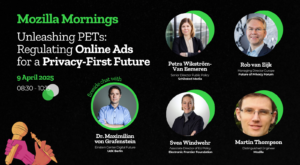As in many parts of the world, EU lawmakers are eager to get greater insight into the ways in which digital technologies and online discourse can serve to both enhance and create friction in democratic processes. In context of its recent ‘Democracy Action Plan’ (EDAP), we’ve just filed comments with the European Commission, with the aim of informing thoughtful and effective EU policy responses to key issues surrounding democracy and digital technologies.
Our submission complements our recent EU Digital Services Act filing, and focuses on four key areas:
- The future of the EU Code of Practice on Disinformation: Mozilla was a founding signatory of the Code of Practice, and we recognise it as a considerable step forward. However, in policy terms, the Code is a starting point. There is more work to be done, both to ensure that the Code’s commitments are properly implemented, and to ensure that it is situated within a more coherent general EU policy approach to platform responsibility.
*** - Meaningful transparency to address disinformation: To ensure transparency and to facilitate accountability in the effort to address the impact and spread of disinformation online, the European Commission should consider a mandate for broad disclosure of advertising through publicly available ad archive APIs.
*** - Developing a meaningful problem definition for microtargeting: We welcome the Commission’s consideration of the role of microtargeting with respect to political advertising and its contribution to the disinformation problem. The EDAP provides an opportunity to gather the systematic insight that is a prerequisite for thoughtful policy responses to limit the harms in microtargeting of political content.
*** - Addressing disinformation on messaging apps while maintaining trust and security: In its endeavours to address misinformation on messaging applications, the Commission should refrain from any interventions that would weaken encryption. Rather, its focus should be on enhancing digital literacy; encouraging responsive product design; and enhancing redress mechanisms.
A high-level overview of our filing can be read here, and the substantive questionnaire response can be read here.
We look forward to working alongside policymakers in the European Commission to give practical meaning to the political ambition expressed in the EDAP and the EU Code of Practice on Disinformation. This, as well as our work on the EU Digital Services Act will be a key focus of our public policy engagement in Europe in the coming months.










